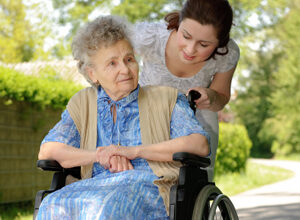Choosing home healthcare can be a very difficult and complicated decision. Experienced elder law and estate planning attorneys should be able to help you avoid home healthcare mistakes because they have experience in this area. We actually have quite a few tools that we can use to help make good decisions and safeguard against risks. The following is a list of 14 things to watch out for when deciding whether or not to have home healthcare.
Avoid these 14 home healthcare mistakes:
1. Inattentive caregivers without proper supervision. Who can check up on what’s going on at the house? It can be family who’s close by or even a hired “watchdog.” Either way, it’s important that there is some oversight happening.
2. Hiring caregivers on your own without thinking of all the management, tax and liability issues. While hiring someone on your own may seem like a good way to get quality care, there is a business side to things that you may not really want to deal with.
3. Veterans Aid and Attendance benefits only cover medical expenses, not household help. If all you need is help around the house now, then it is too soon to seek VA benefits for care.
4. Gifting to kids, when it is actually payment for care, may jeopardize future Medicaid options. Most people are aware that qualifying for Medicaid can be tricky. When the time comes for Medicaid, you want to be sure it’s available to you.
5. Mixing up your finances and bills (accounts, income, credit cards) with your child’s finances and bills can lead to problems.
6. Wearing down your spouse or kids if they are the caregivers. Caring for a loved one can be physically and emotionally exhausting. Are your loved ones able to handle the responsibility and physical demands?
7. Theft by caregivers. Sadly, this is all too common — which is why No. 1 is so important. Read more about the most common types of elder fraud here.
8. “Under the table” cash payments can cause a lot of problems down the road. They can jeopardize future Medicaid benefits, aren’t deductible as medical expenses and expose you to the possibility of an IRS audit for lack of payroll tax withholding.
9. Lack of liability insurance for the actions of caregivers. If, for example, there is a car accident involving the caregiver while on the job, lack of liability insurance could jeopardize your financial security.
10. Doing finances on your own if you are too sick to give it proper attention can lead to a greater risk of falling for scams, misuse of funds by others or unpaid bills.
11. A child who is “helping” but ends up using your money unwisely for their own purposes. Sadly, this is fairly common. Before allowing a child to help, consider that child’s personality and their track record of responsibility.
12. A “moocher” relative offers to live with you, but in reality is not much help. Just like No. 4 above, before hiring a relative to help, take into consideration why they would be a good caregiver. Don’t just give them the job because they’re related to you.
13. One child does all the caregiving, but is not paid for it — and this is perceived as unfair, which causes problems.
14. One child is getting paid for providing care, but siblings think that is unfair — and that causes problems among your children.
There is a lot to keep in mind when considering home healthcare, but we help guide people in these decisions every day — weighing the pros and cons. Be sure to check out our post, 9 Ways an Elder Law Attorney Can Help You With In-Home Care for more information. If you need to speak to someone right away about your current situation, our Elder Care Advisors are the first line of help when it comes to most elder issues. We would be more than happy to speak with you at 217-726-9200.

